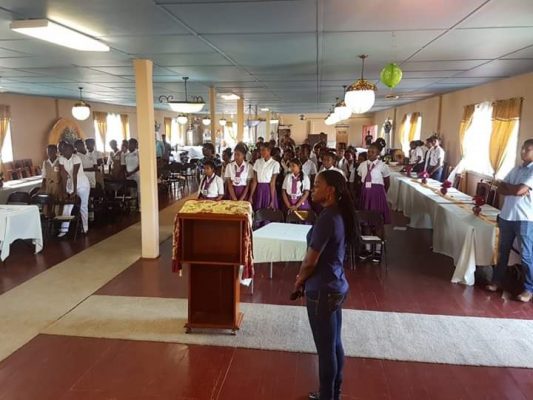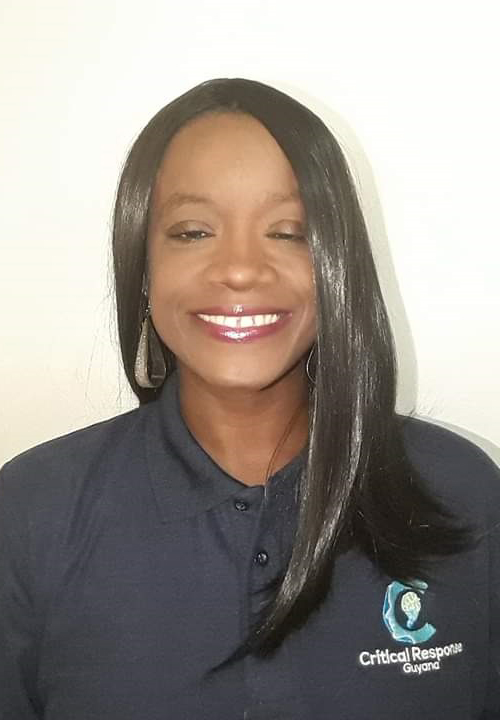Growing up, Petra Richmond dealt with her challenges and pain silently and in her attempt to keep it all in, she self-harmed and wanted to end her life. As she became an adult, she knew that her profession would have to be about helping others to navigate those challenges in their lives.
“As a young woman growing up, I had my own struggles with depression and suicide. [I] attempted suicide a number of times and I was lucky to come out and I am blessed to be alive and to be given this great opportunity to help other young people,” Richmond candidly told Stabroek Weekend in an interview.
Richmond completed a Bachelor’s Degree in Social Work at the University of Guyana and shortly after founded an organisation, ‘Critical Response Guyana’, which recently celebrated its first anniversary.

The organisation, which is non-profit, focusses on suicide prevention in children and youths. It provides counselling, training and support for spiritual and psychological issues which render young people incapable of dealing with challenges of everyday life and which may contribute suicide. Its services are also extended to young adults.
The focus on training is key as Richmond believes that if people are given the tools, they can help others. She said many believe her organisation is geared to save people from committing the actual act and while that may be true at times, the greater focus is on equipping youths with the tools that are needed to deal with mental health issues. Doing so, she said, creates “more resilient adults, who are able to deal with and face challenges better in life.”
In a move that will boost her own training in the area, Richmond applied for and was recently awarded a Chevening scholarship to pursue a Master’s Degree in Applied Psychology in Health and Forensic Psychology at the University of Bedfordshire, England.
Being a youth herself, Richmond understands the issues young people face. Apart from depression, she also had anxiety and was at times stressed and burnt out because of abuse and the other struggles she faced.
“All of those things played a major role in me later on wanting to commit suicide,” she said as she recalled that for years she suffered because she did not get the help she needed.
Richmond said she has found that many affected youths come from families where someone committed suicide. “There is always that risk and that question mark there. You find those persons tend to be in very deep state of depression…,” she said.
There are many who also face abuse and she said where this issue is concerned it is “just out of this world. A lot of the time we focus on the older children, but the primary school children are also affected, and they suffer a lot.”
Apart from the abuse what is also of major concern to Richmond is the fact while sometimes the victim gets justice, the counselling received is limited or non-existent.
“Sometimes, they are forgotten and there are instances also where mothers remain with the abuser and the child is forced to live with that person in their homes. The abuse situation where youths are concerned is the leading cause for depression and it is one of the leading causes for suicide in teenagers,” Richmond said.
Training
While Richmond is the founder of Critical Response, she shared that the organisation is managed by a ten-member board and supported by a number of volunteers, mostly focussed in Berbice.
Because of the high incidence of suicide in the Berbice area, Richmond said a lot of their training has been focussed in communities in that region, mainly in the lower and upper Corentyne area.
Explaining the organisation’s training programme, Richmond noted that it has been done through the Ministry of Education in schools and it focusses on suicide prevention as children are taught about the risk factors and warning signs of suicide and how to respond. The students are trained how to respond in an acute situation, and this is done with the assistance of a medical doctor who teaches the children how to respond if someone attempts to take their life.
Depression is also addressed during the training and the students are taught to spot the warning signs and how to reach out for help in a timely manner.
So far, training has been provided to students of 11 secondary schools.
The organisation works under two main branches—SALT (Save A Life Today) and LIGHT (Leadership Intervention Guidance and Healing Training). SALT is the organisation’s community outreach empowerment programme, while LIGHT focusses on training leaders in suicide prevention to respond in a timely and effective manner.
Under the LIGHT aspect, the leaders, who include teachers, are trained how to engage the Ministry of Education for help and also how to engage the community and also organisations that can help, and through which referrals can be made. They are encouraged to form safe spaces where persons can learn about suicide and mental health and they can know there is someone they can speak to.
“Our strategy focuses on something called ICE (Identify, Counteract, Empower) and this is what we take individuals who come to us for help through,” she explained.
During the “Identify” aspect, the problems and the root causes are addressed, while “Counteract” looks at building a response strategy that is suited to the individual. “There isn’t one specific package that we use to counteract. We build a response around the individuals. We look at what is your support system, who do you have around you, what can we use that is in your natural environment….”
In terms of empowering, the organisation focuses on bringing individuals to a place where they can stand on their own without help.
“What happens, the end result, is that we must have whole, happy, healthy individuals who are ready and able without support to now effectively handle the challenges in life,” Richmond said.
Just recently, the organisation collaborated with Choose Life from Jamaica, which provided training for Richmond and the board members. “Training is ongoing. Work is ongoing and at this point we are not biting off more than we can chew, we are just moving forward as God leads us and doing what we can accommodate,” she said.
Richmond had done youth work before with a religious body, but she has since quit that job to focus fully on Critical Response.
At present, the organisation garners funding mainly for specific projects and this not only comes from other organisations but also from individuals who believe in the work and she said it is nothing extravagant. They have not made any real appeals for funding because the organisation’s registration as a Friendly Society, which was submitted last year, is still being processed.
Looking forward, Richmond said that people can expect the organisation to introduce a ‘King’s’ programme, which is being built by a group of professional men. This programme is being designed out of the need for the mental health of men to be addressed, as Richmond noted that enough is not being done about this issue.
“We are building a programme to be able to reach young men, to get them talking about their feelings, talking to them about their feelings, talking to them about relationship issues… and all those other problems that they face so that they will be able to face the challenges in life,” she said.
While men commit suicide, Richmond said, a lot of the programmes are focused on women and as a result, she wants to “change that up a little bit.”
There will also be a programme called ‘Leap,’ which will focus on younger children, a ‘Peace’ programme geared towards Christian youth, ‘Circle’ that will include entire families and the ‘hope’ programme that focuses on helping the bereaved.
To contact Critical Response persons can call 660-7822 or 610-4814 or email criticalresponse@gmail.com.





